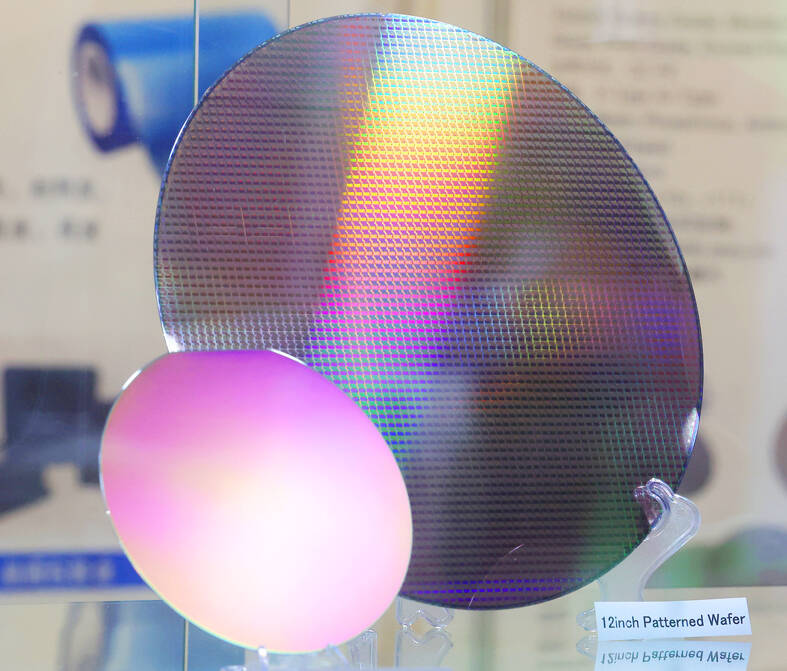A record number of exhibitors will this year attend Semicon Taiwan, an annual international trade fair in the semiconductor technology sector, when it opens on Wednesday next week in Taipei, organizer SEMI Taiwan said yesterday.
The annual event will feature more than 3,600 booths from over 1,100 exhibitors from home and abroad, the highest number since it was first held in 1996, according to SEMI Taiwan, an organization located in Hsinchu County that connects about 3,000 member companies and 1.5 million professionals worldwide to advance the technology and business of electronics design and manufacturing.
Ray Yang (楊瑞臨), an international strategy development consulting director at the government-sponsored Industrial Technology Research Institute (ITRI) and a committee member at SEMI Taiwan, said this year’s event has a theme of "Empowering AI Without Limits," and highlights the significance of silicon photonics and fan-out panel level packaging (FOPLP).

Photo: CNA
A forum focusing on silicon photonics will be held during the event, featuring experts from organizations and companies, including Taiwan Semiconductor Manufacturing Co (TSMC, 台積電), Inter-university Microelectronic Centre, and Marvell Technology Group Ltd, for discussions regarding the opportunities and challenges facing silicon photonics, Yang added.
Silicon photonics — known for its high bandwidth, low power consumption, long-distance transmission and cost-saving features — has become a hot topic in the semiconductor industry. It is estimated that the global silicon photonics market could reach US$7.86 billion by 2030.
In addition, a forum on FOPLP will also be held, with experts including those from Applied Materials Inc, Manz AG and Advanced Semiconductor Engineering Inc discussing and exploring related technological developments.
Driven by demand for 5G, artificial intelligence of things, automotive, high-performance computing and consumer products, FOPLP shows significant growth potential. According to research firm Yole Group, the market is expected to reach US$221 million by 2028, with a compound annual growth rate of 32.5 percent from last year to 2028.
Meanwhile, several TSMC senior managers, including executive vice president and co-chief operating officer YJ Mii (米玉傑), vice president of Pathfinding and Corporate Research Min Cao (曹敏), vice president of Advanced Packaging Technology and Service Jun He (何軍) and director of Advanced Packaging Business Development Jerry Tsou (鄒覺倫), will deliver speech at different forums during the event, Yang said.
He added that there will be 13 country sections at this year’s exhibition, with France, Malaysia and the Philippines new additions to the list.
Semicon Taiwan will take place from Wednesday to Friday at the Taipei Nangang Exhibition Center.

To many, Tatu City on the outskirts of Nairobi looks like a success. The first city entirely built by a private company to be operational in east Africa, with about 25,000 people living and working there, it accounts for about two-thirds of all foreign investment in Kenya. Its low-tax status has attracted more than 100 businesses including Heineken, coffee brand Dormans, and the biggest call-center and cold-chain transport firms in the region. However, to some local politicians, Tatu City has looked more like a target for extortion. A parade of governors have demanded land worth millions of dollars in exchange

An Indonesian animated movie is smashing regional box office records and could be set for wider success as it prepares to open beyond the Southeast Asian archipelago’s silver screens. Jumbo — a film based on the adventures of main character, Don, a large orphaned Indonesian boy facing bullying at school — last month became the highest-grossing Southeast Asian animated film, raking in more than US$8 million. Released at the end of March to coincide with the Eid holidays after the Islamic fasting month of Ramadan, the movie has hit 8 million ticket sales, the third-highest in Indonesian cinema history, Film

Taiwan Semiconductor Manufacturing Co’s (TSMC, 台積電) revenue jumped 48 percent last month, underscoring how electronics firms scrambled to acquire essential components before global tariffs took effect. The main chipmaker for Apple Inc and Nvidia Corp reported monthly sales of NT$349.6 billion (US$11.6 billion). That compares with the average analysts’ estimate for a 38 percent rise in second-quarter revenue. US President Donald Trump’s trade war is prompting economists to retool GDP forecasts worldwide, casting doubt over the outlook for everything from iPhone demand to computing and datacenter construction. However, TSMC — a barometer for global tech spending given its central role in the

Alchip Technologies Ltd (世芯), an application-specific integrated circuit (ASIC) designer specializing in server chips, expects revenue to decline this year due to sagging demand for 5-nanometer artificial intelligence (AI) chips from a North America-based major customer, a company executive said yesterday. That would be the first contraction in revenue for Alchip as it has been enjoying strong revenue growth over the past few years, benefiting from cloud-service providers’ moves to reduce dependence on Nvidia Corp’s expensive AI chips by building their own AI accelerator by outsourcing chip design. The 5-nanometer chip was supposed to be a new growth engine as the lifecycle